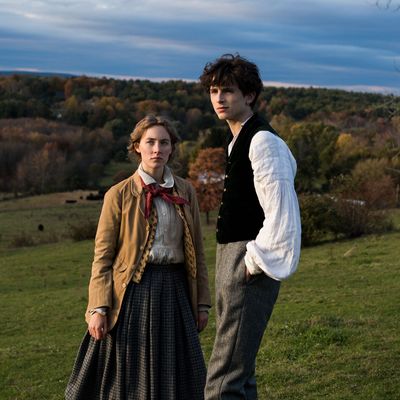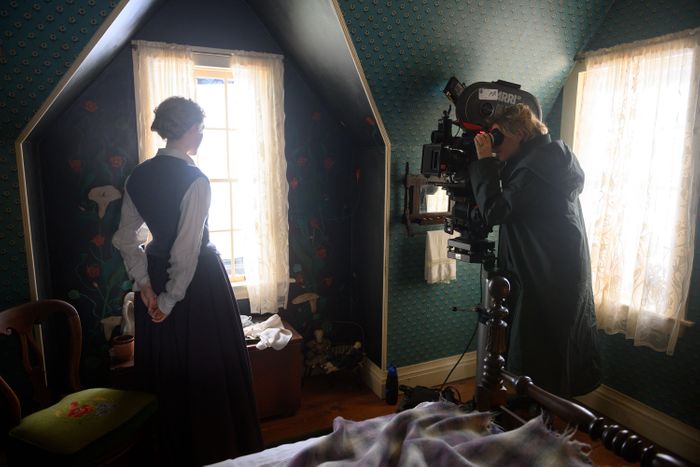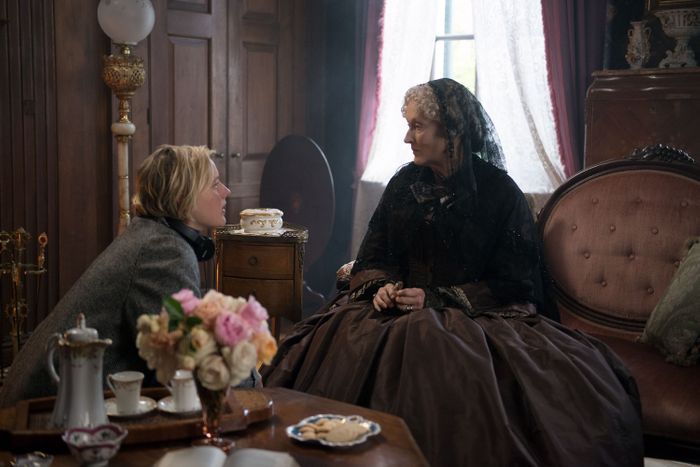
There are roughly 18,000 people currently living in Concord, Massachusetts, the hometown of Louisa May Alcott and the spot where Greta Gerwig shot a large chunk of her upcoming Little Women adaptation. I’ve touched down in Concord for 36 hours during a surprise snowstorm to talk to as many of these 18,000 people as possible about what it was like to have their tiny town briefly inhabited by Meryl Streep, Timothée Chalamet, Saoirse Ronan, Laura Dern, Emma Watson, Florence Pugh, and Eliza Scanlen. I soon learn, in addition to compelling tidbits about Emma’s shopping habits and Meryl’s takeout preferences and Timothée’s gift-giving, that every single one of them would rather tell me something about Chris Evans.
Over a century and a half ago, Alcott herself was the Concord celebrity about whom outsiders gossiped. After she published the second half of Little Women, the New England town became something of a pilgrimage site for devotees of the story, who ventured to Massachusetts to catch a glimpse of its famous author. Looking back, the paparazzi problems seem quaint: Newspapers sent sketch artists to sit on her fence and peer through her windows. In protest, Alcott threatened to use a garden hose on them. In 2019, the residents of Concord seem slightly more cheerful about being intruded upon; as I sludge through the little town on a deserted Monday afternoon, with the objective of getting some good-natured gossip about the Little Women cast, most of them are excited to share deeply random observations on Gerwig & Co., and, at one point, Tom Cruise’s depraved bunny collecting.
My first stop in Concord is Helen’s, a greasy spoon that’s just a brief snow-choked walk from my hotel, during which I appear to be the only person left on Earth. I arrive around 3 p.m., just before it’s about to close owing to the weather. My server, Helen — not the titular Helen; that was her grandmother — tells me, “I waited on Emma, uh, what? She came in with her boyfriend. They had the morning quesadilla and the wrap.” I ask Helen if she recognized them. “I didn’t, but everyone else did. I said, ‘Everybody’s looking at you. Are you an actress?’ She said, ‘Shh.’” Helen’s brother, Paul, who owns the diner, interjects, “I think her boyfriend was a fund manager,” he says. Helen nods sadly; she doesn’t think they’re going together anymore.
“You know who comes in all the time, though? Chris Evans,” Helen says, her face brightening. “The funny thing is, his mother was our regular customer and she never, ever said that she was Chris Evans’s mom. All these years!” After asking me where I went to journalism school (Harriet the Spy by Louise Fitzhugh) and informing me that I am “staying at the wrong hotel” (The Colonial Inn, an adorable old-timey spot conveniently located four seconds from everything), Paul tells me I should go to Woods Hill Table in West Concord for more information. “Sit at the bar. Have the Faroe Island salmon. The cast went there all the time. And they all stayed in people’s houses. The movie companies kick people out, and then pay for their houses.”
Alas, Woods Hill is closed on Mondays, so instead, Paul leads me next door to a local art gallery, Lacoste Kean. “Who’s in Little Women again?” asks Lucy, the woman behind the front desk. I remind her. “Oh, yes. An incognito star from England came in, but I didn’t recognize her,” she says. “She bought two magnificent ceramic vessels from us … her boyfriend came to pick them up.” I ask her how much the two ceramic vessels might’ve run Emma. “Between $4,000 and $5,000 for the pair. She was fine about it.” Paul, who has stayed for the interview and now seems intent on abetting my mission, asks Lucy if “Mark” is around. (I never meet nor learn who Mark is.) “Mark will be coming back,” Lucy says. “He knows Chris Evans.”
On the way to my next destination, I hop on the phone with Jan Turnquist, an absolute freaking delight of a woman who serves as executive director of Orchard House, Louisa May Alcott’s ancestral home. Jan consulted heavily on Gerwig’s film, working with the set designer, Jess Gonchor, to recreate Orchard House offsite in its entirety. She also helped the cast get into character by showing them the bedrooms and artifacts of their real-life inspirations.
“Because Little Women was written and set at Orchard House, the whole cast started right out by coming here,” she says. “And I met them all very early on. Greta came to the house, I believe three times, with different people. I spent quite a bit of extra time with Laura Dern, because she really had a lot of questions about Marmee.” Jan tells me that the cast stayed in the homes of real Concord residents, and that I should speak to a man named Michael Goodwin about his experiences hosting. This is not the last time someone will refer me to Michael Goodwin.
My next stop is Revolutionary Concord, a sort of catch-all arts-and-crafts store that bills itself as the “shop for EVERYTHING Concord.” Marie, the owner, greets me cheerfully in a pair of black-and-green cat ears (“These are my serious Christmas ears.”). “Emma Watson came in and was very sweet and great,” she says. “She doesn’t like people taking photos with her, but she’ll sign autographs … And Laura Dern came in and got a couple of Concord T-shirts that said, ‘I came, I saw, I Concord.’” I ask if Marie sold anything to any of the other cast members. “I may have seen the others,” she says, shrugging. “Who knows?” Marie does list off a series of additional celebrities she’s sold things to: James Taylor. André Previn. Nicole Kidman. Tom Cruise. And Chris Evans. “He always has his baseball cap on. And he always pays in cash.”
I stop Marie there, and tell her I need more information about Tom Cruise’s and Nicole Kidman’s purchases. “I was not a Tom Cruise fan, but he was filming The Firm,” she says. “Tom came back with a bodyguard, and I didn’t recognize him. He said, ‘My wife collects bunnies.’ I said, ‘Are you Tom Cruise?’ He said, ‘Yes.’ He bought some Bunnies by the Bay for her. And for three years, he’d call me every year and say, ‘I need some more bunnies.’” I ask Marie what a “Bunny by the Bay” might be. “They’re large bunnies made in Washington by two sisters in elaborate velvet,” she says. “They were signed and numbered. They don’t make them anymore. He’d buy several every year — a male/female couple, dressed in Victorian English attire. They were $250 each.”
Before I leave, Marie gives me a long list of other people to talk to in town, including the staff at Main Street Café, a few doors down. At first, the staff seems profoundly unexcited by my questions — until I bring up Timothée. “I’ve actually seen him!” says a teenage server named Alexandra. “He sat down and had a meal and I saw him talking to a girl. I don’t know who she was. She had blonde hair. He was wearing a hat. Some of the younger people here were freaking out.”
Another server, Becky, interjects. “Well, we have Chris Evans come in a lot, so it’s hard,” she says, referring to their relative lack of enthusiasm about the Little Women cast. Alexandra nods happily. “He’s always wearing a baseball cap.”
Becky directs me to Grasshopper Shop, which sells “eccentric women’s clothing and accessories,” and is approximately one foot away, like everything is in Concord. The town has roughly three streets: Walden, Thoreau, and Main; there is a strip mall on Thoreau Street called the “Thoreau Shopping Center,” which feels like something that would have instantaneously killed Thoreau. “Emma Watson bought a lot of socks here,” says Patti, who’s behind the counter. “She bought 60 pairs.”
This encounter leads me to FatFace, a women’s boutique whose name feels counter to its cause, where salesperson Alex tells me one of her friends ran into Timothée Chalamet and didn’t realize who he was. “They were having a conversation about acai bowls,” she says. “He was like, ‘Thanks for not asking for any pictures or anything.’ She was like, ‘What?’ Then she really looked at him and was like, ‘Oh, my God.’ They were talking for ten minutes about acai bowls.”
I stop three teenage girls giggling at their iPhones on their way out of FatFace. “Timothée Chalamet was staying at my friend’s house, over there,” one says, pointing into the distance. “I don’t think a lot of people know about this. I have something that kind of exposes him.” I encourage her to share and explain that I won’t include her name. “No, I want to be famous!” she laughs. “He would like, order Chinese food and not clean up. He’d make them clean it up. And then he’d like, smoke in the house and it smelled bad. But he gave my friend a diary as a present when he left. They liked him.”
Another teen interrupts. “My family friend does yoga classes and Emma Watson called her for private yoga,” she says. “She didn’t know it was Emma. And for three months she couldn’t tell her husband or kids anything. She like, signed a contract.”
The third teen interjects. “I’m famous on TikTok. Do you want to see?” We all pause beneath the freezing sleet and watch a video of the trio dancing and accidentally knocking their hips into a dog’s head. “It’s been viewed millions of times,” she says.
I walk a few storefronts down to Fiorella’s, another one of Marie’s recommendations and an Italian restaurant with extreme Sopranos vibes. A man named Ralph tells me he’s been running restaurants longer than I’ve been alive, which is weird, because I feel like I’ve been alive for hundreds of years and spent all of them roaming around Concord, bothering people. “Emma came in and Laura came in and Meryl ordered takeout. It was kinda funny to see the name ‘Meryl Streep’ on takeout,” he says. “And Chris Evans came in a couple times … He tries to stay incognito, but you’re like, ‘Oh my god, that’s Captain America!’ ” I gently circle Ralph back to Meryl: What did she order? “She had chicken Parmesan. Number-one selling item in Fiorella’s.” Before I depart, Ralph tells me that I need to talk to Michael Goodwin. “He rented his house to them,” he says, with no further explanation on how to get in touch.
Next, I stop into a Caffé Nero outpost. The sky is darkening. I feel closer to Timothée Chalamet and farther away from my real life than I ever have before. On a whim, I ask a random teenage girl sitting with friends near the fireplace if she has any fun stories for me. “Oh my god,” she says, her eyes widening. “This is fate. I used to work here and a year ago, my boyfriend and I had just broken up, and the cutest guy I’d ever seen in the world walked in. He was so friendly and smiley. My co-worker was like, ‘Go talk to him.’ I waited until the end of my shift, and I was ready to put it out there, but when I came around the corner he was gone … I still think about him to this day, and a month ago, I’m telling my mom about the man of my dreams. I described him perfectly, and she goes, ‘That’s Timothée Chalamet.’”
At the Concord Bookshop, I learn that Greta Gerwig is “very interested in science, very esoteric science books. She bought Gödel, Escher, Bach.” Elsewhere, I learn that Laura Dern’s daughter loves three-cheese ravioli. Saoirse and Timothée frequented a local Asian-fusion restaurant called Karma (“Chris Evans was also here, to grab takeout”), and ordered a lot of “normal sushi,” but they “don’t drink.” “You need to talk to my friend, Michael,” says the bartender at Karma. “He just left five minutes ago. He rented his house to them. I think he went to Fiorella’s.”
Exhausted but firmly devoted to my cause, I trudge back to Fiorella’s to look for the enigmatic Michael Goodwin. At the bar, there’s a group of men who look to be in their 50s, with faces that betray a lifetime of afternoon drinking and inherited sexism. Against my better judgement, I approach them in hopes of finding Michael; all of them instantly give me fake names and boast about how they refused to loan their home to Meryl Streep.
Back in my hotel, which one of the art-gallery employees calmly informed me was haunted, I grab a glass of wine and settle in front of a dying fire in order to counterbalance the absolute fuckboi anarchy of the previous conversation. The hotel is silent, with all of its component parts nearly shut down due to the storm. Just as I begin to wonder about the point of it all (life, Beth’s death, this story), a man with curly brown hair wanders in, wet from the snow, having casually cross-country skied into the hotel. “Mind if I sit here?” he says. He takes the seat next to me. We engage in a little small talk, he tells me his name is Michael. I rise from my chair like a tipsy sea witch. “Are you Michael Goodwin?!?!” I ask. He stares at me, vaguely frightened. I sit back down and explain, in the least disturbing way possible, that I have been looking for him all day, and ask if he has any good stories for me about hanging out with the Little Women cast.
Michael — a local teacher who happens to be the son of renowned presidential historian Doris Kearns Goodwin, but that’s neither here nor there, though perhaps it is there? — tells me he hosted a historical tour of Concord with the cast and “through that, became very friendly with everyone involved.” He will admit to “having dinners and hanging out at my mom’s house” with the cast, most often Laura and Bob Odenkirk and Chris Cooper, but shuts down when I ask for any further details. “I don’t know how comfortable I am telling stories,” he says. “Not that there’s something I’m …” he stops. “There was an intense interest in Concord,” he allows. “Which was fun.”
We stare at each other, each willing the other to mortally betray Meryl Streep. Ghosts of old-timey soldiers watch over us, breathless. “Your last line,” says Michael, “should be that I told you nothing.”




